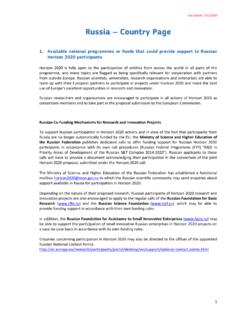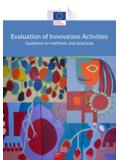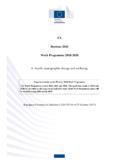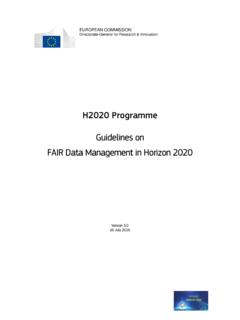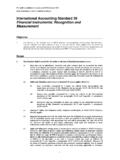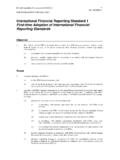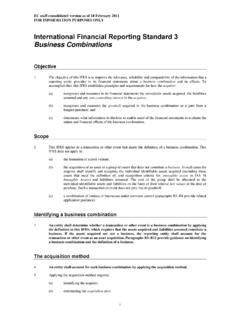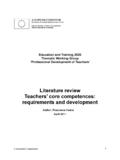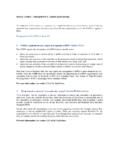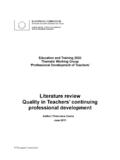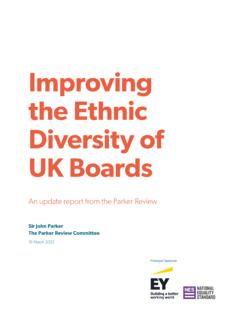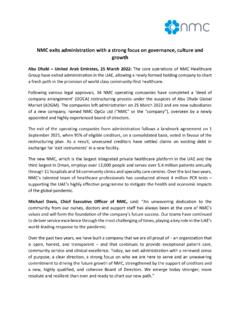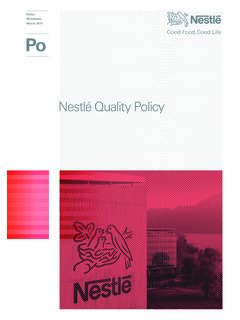Transcription of Erasmus+ Programme (ERASMUS)
1 Erasmus+ Programme (ERASMUS) Call for proposals Partnerships for excellence European Universities - ERASMUS-EDU-2022-EUR-UNIV Version 30 NOV 2021 Call: Partnerships for excellence European Universities- (ERASMUS-EDU-2022-EUR-UNIV) EU Grants: Call document (ERASMUS): 2 CALL FOR PROPOSALS TABLE OF CONTENTS 1. Background .. 4 2. Objectives Themes and priorities Activities that can be funded Expected impact .. 4 Objectives .. 4 Themes and priorities (scope) .. 5 Activities that can be funded (scope) .. 7 Expected impact .. 8 3. Available budget .. 9 4. Timetable and deadlines .. 10 5. Admissibility and documents .. 10 6. Eligibility .. 11 Eligible participants (eligible countries) .. 11 Consortium composition .. 13 Eligible activities .. 13 Geographic location (target countries).
2 14 Duration .. 14 7. Financial and operational capacity and exclusion .. 14 Financial capacity .. 14 Operational capacity .. 15 Exclusion .. 15 8. Evaluation and award procedure .. 16 9. Award criteria .. 17 10. Legal and financial set-up of the Grant Agreements .. 21 Starting date and project duration .. 22 Milestones and deliverables .. 22 Form of grant, funding rate and maximum grant amount .. 22 Budget categories and cost eligibility rules .. 23 Reporting and payment arrangements .. 23 Pre-financing guarantees .. 23 Certificates .. 24 Liability regime for recoveries .. 24 Provisions concerning the project implementation .. 24 Non-compliance and breach of contract .. 24 11. How to submit an application .. 25 12. Help .. 26 13. Important .. 27 EUROPEAN EDUCATION AND CULTURE EXECUTIVE AGENCY (EACEA) - Erasmus+, EU Solidarity Corps - European Higher Education Call: Partnerships for excellence European Universities- (ERASMUS-EDU-2022-EUR-UNIV) EU Grants: Call document (ERASMUS): 3 0.
3 Introduction This is a call for proposals for EU action grants in the field of Higher Education under the Erasmus+ Programme . The regulatory framework for this EU Funding Programme is set out in: Regulation 2018/1046 (EU Financial Regulation) The basic act (Erasmus+ Regulation 2021/8171). The call is launched in accordance with the Erasmus+ 2022 Work Programme2 and will be managed by the European Education and Culture Executive Agency (EACEA) ( Agency ). Please note that this call is subject to the final adoption of the budget by the EU budgetary authority. In case there are substantial changes, we may have to modify the call (or even cancel it). The call covers the following topics: - ERASMUS-EDU-2022-EUR-UNIV-1 European Universities Intensification of prior deep institutional transnational cooperation - ERASMUS-EDU-2022-EUR-UNIV-2 European Universities Development of new deep institutional transnational cooperation Each project application under the call must address only one of these two topics.
4 Applicants wishing to apply for more than one topic, must submit a separate proposal under each topic. We invite you to read the call documentation carefully, and in particular this Call Document, the Model Grant Agreement, the EU Funding & Tenders Portal Online Manual and the EU Grants AGA Annotated Grant Agreement. These documents provide clarifications and answers to questions you may have when preparing your application: The Call Document outlines the: Background, objectives, scope, activities that can be funded and the expected results (sections 1 and 2). Timetable and available budget (sections 3 and 4). Admissibility and eligibility conditions (including mandatory documents; sections 5 and 6). Criteria for financial and operational capacity and exclusion (section 7).
5 Evaluation and award procedure (section 8). Award criteria (section 9). Legal and financial set-up of the Grant Agreements (section 10). How to submit an application (section 11). the Online Manual outlines the: Procedures to register and submit proposals online via the EU Funding & Tenders Portal ( Portal ). Recommendations for the preparation of the application. the AGA Annotated Grant Agreement contains: 1 Regulation (EU) 2021/817 of the European Parliament and of the Council of 20 May 2021 establishing Erasmus+: the Union Programme for education and training, youth and sport and repealing the Regulation 1288/2013 (OJ L189/1). 2 Commission Implementing Decision C(2021) 7862 final of 08/11/2021 concerning the adoption of the work Programme for 2022 and the financing decision for the implementation of the Erasmus+ Programme .
6 Call: Partnerships for excellence European Universities- (ERASMUS-EDU-2022-EUR-UNIV) EU Grants: Call document (ERASMUS): 4 Detailed annotations on all the provisions in the Grant Agreement you will have to sign in order to obtain the grant (including cost eligibility, payment schedule, accessory obligations, etc). You are also encouraged to visit the Erasmus+ Project Results website to consult the list of projects funded previously. 1. Background Heads of state and government called in the European Council Conclusions of 14 December 2017 on the Member States, the Council and the European Commission, in line with their respective competences, to take work forward in encouraging the emergence of 'European Universities'. The Member States support for the initiative has been reiterated, notably in the February 2021 Council Resolution on a Strategic framework for European cooperation in education and training towards the European Education Area and beyond (2021-2030) that states that higher education institutions will be encouraged to find new forms of deeper cooperation, namely by creating transnational alliances, (.)
7 And through the full roll-out of the European Universities initiative. The Council Conclusions on the European Universities initiative, adopted on 17 May 2021, invited Member States and the Commission to consider more sustainable funding instruments for the European Universities , while taking into account the diversity of the cooperation models. The Commission has co-created the European Universities initiative with Member States and stakeholders as of 2018 and launched under Erasmus+ two calls for proposals in 2019 and 2020. Currently, 41 European Universities have been selected and are up and running3 collectively involving over 280 higher education institutions of various sizes and types located across Europe, triggering unprecedented levels of institutionalised cooperation, making it systemic, structural and sustainable.
8 Building on progress so far, the new legal basis of the Erasmus+ 2021-20274 Programme enshrines the support for the European Universities as an integral part of the current Programme , allowing for the full roll out of the initiative. Horizon 2020 later on complemented support for the R&I dimension of European Universities with up to 2 MEUR top up funding per European University. 39 out of the 41 European Universities are selected for this additional Horizon Europe funding. 2. Objectives Themes and priorities Activities that can be funded Expected impact Objectives The European Universities initiative is pivotal to achieving the ambitious vision of an innovative, globally competitive and attractive European Education Area by 2025, in full synergy with the European Research Area and the European Higher Education Area, by transforming the institutional cooperation between higher education institutions and bring it to the next level.
9 It mobilises all four missions of higher education institutions: education, research and innovation and service to society. They will test diverse innovative and structural models for implementing and achieving systemic, structural and sustainable cooperation, in full respect of higher education landscape diversity. They will serve as inspiration for the wider higher education sector. 3 Call results 2019: ; Call results 2020 : . 4OJ L189 . Call: Partnerships for excellence European Universities- (ERASMUS-EDU-2022-EUR-UNIV) EU Grants: Call document (ERASMUS): 5 As such, European Universities aim at achieving the following main objectives: Promote common European values as enshrined in article 2 of the Treaty on European Union and a strengthened European identity by bringing together a new generation of Europeans who are able to cooperate and work within different European and global cultures, in different languages, and across borders, sectors and academic disciplines.
10 Reach a substantial leap in quality, performance, attractiveness and international competitiveness and enable deep institutional transformation of involved European higher education institutions and contribute to the European knowledge economy, employment, creativity, culture and welfare by making best use of innovative pedagogies and striving to make the knowledge square5 a reality. European Universities will be key drivers to boost the quality of higher education and where possible to strengthen its links to the research and innovation landscape in Europe and its outreach towards the society and economy. The scope of this call for proposals is to support higher education institutions in gradually achieving their long-term ambitious vision towards becoming a fully-fledged European University.
